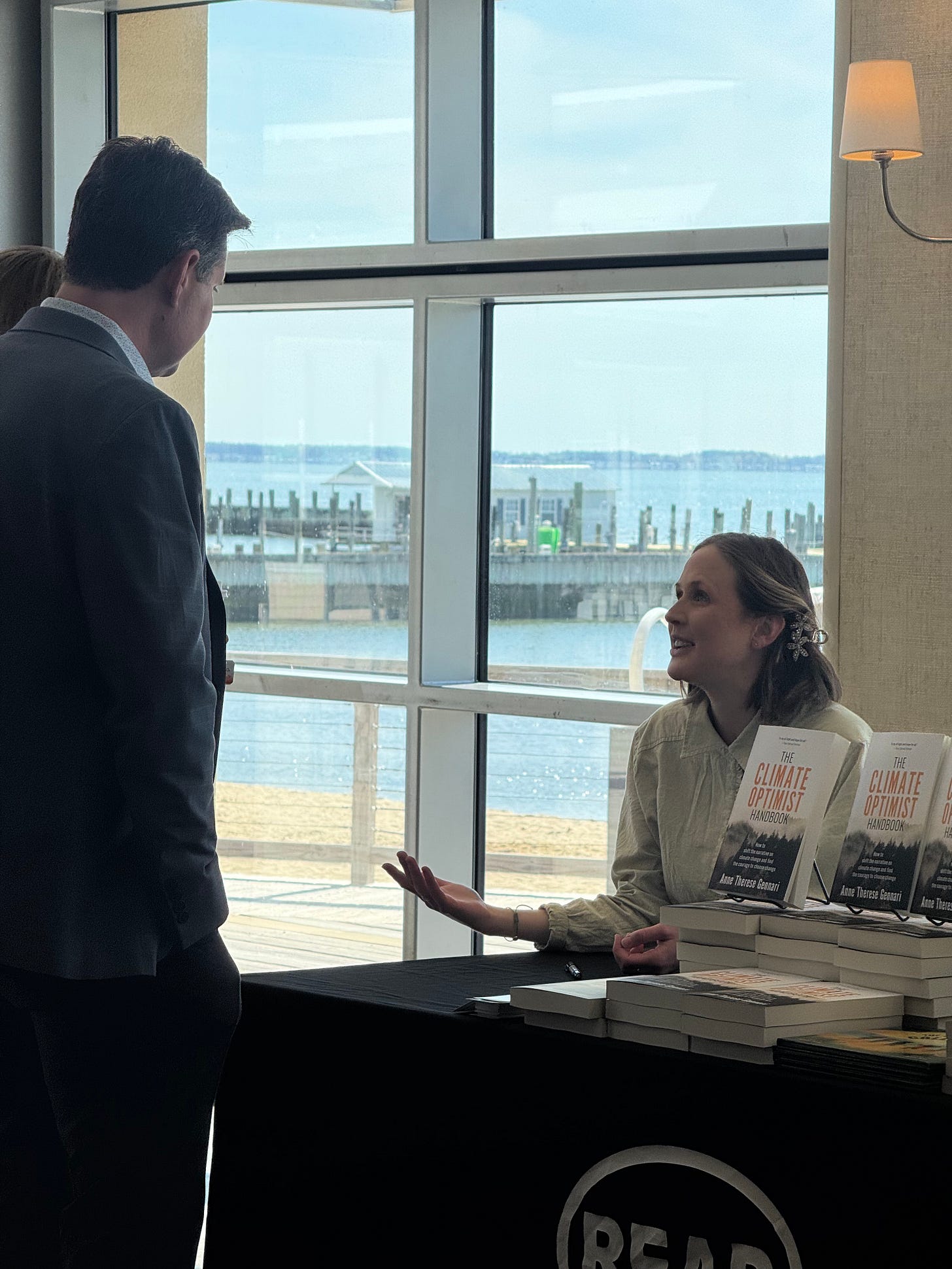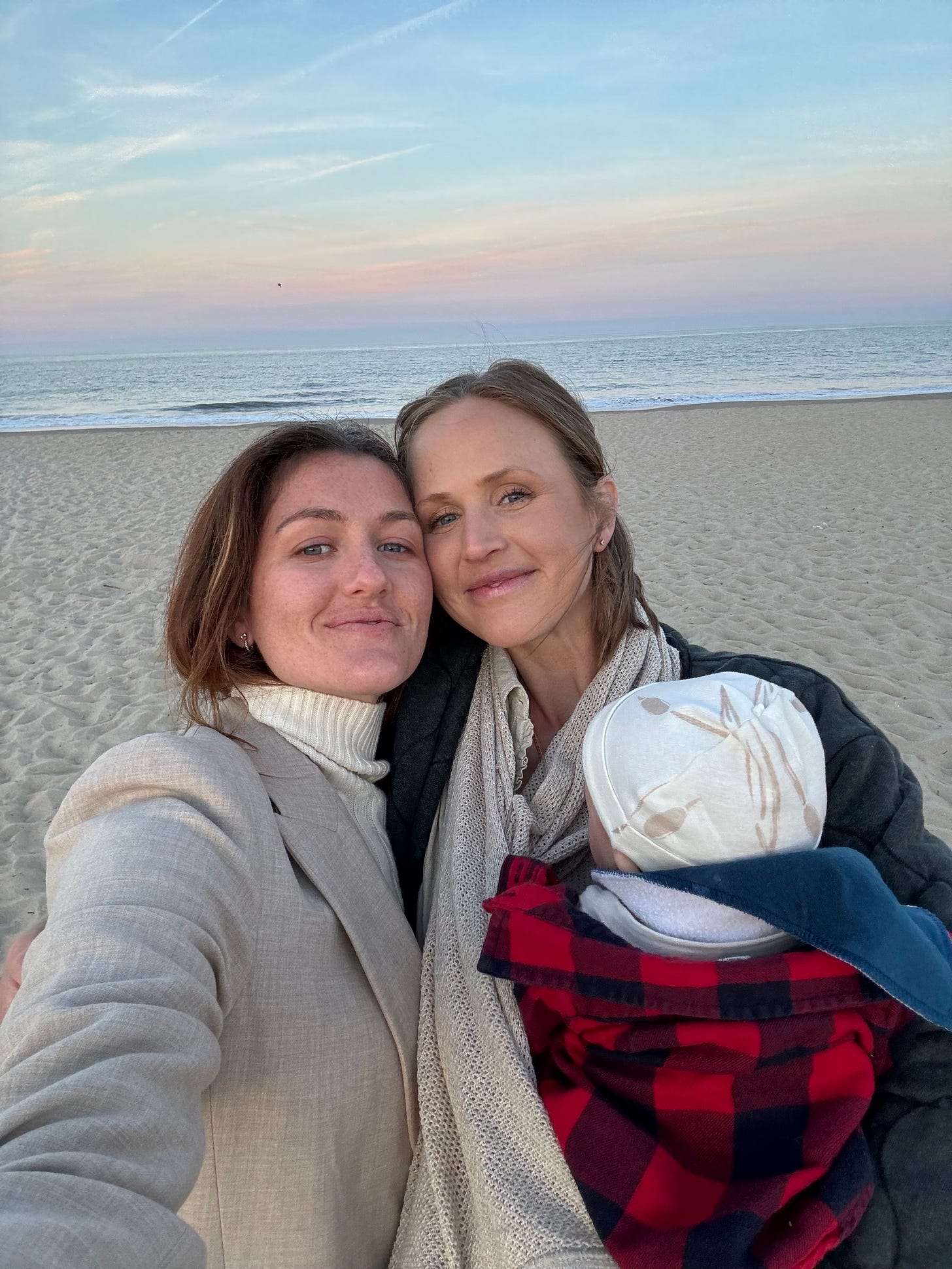The 5 Pillars of Climate Optimism
And how to integrate them where it matters most for YOU.
Earth Week was surely special this year as I embarked on my first work trip with baby. When I was invited to deliver the keynote address at Spotlight Delaware’s climate change conference, Shifting Sands, I said I would love to come, but that it came with special requests. I would have to bring my nursing son and, with him, a chaperone to help out with logistics and travel.
Luckily, they said yes, and the three of us had a fun and adventurous train ride down to the beautiful beaches of Delaware. Growing up by the ocean in Sweden, it felt like a return to home. To be able to put my feet in those salty waters and feel the breeze on my face was like a whisper of reassurance. A hug of comfort and remembrance: this is life. On top of it, we spotted dolphins, and few things could’ve made the trip more magical than that.
However, as always, it’s not the places I visit that make my keynote trips so special, but the people I meet when I’m there. This time was no different.
After my keynote, I sat at my book table in the mingle lobby, and multiple people came over to chat. They all shared what resonated most from my talk, and what tends to be the case, they all had different parts to share.
I really like what you said about tending to our emotions, I find that we forget just how important that is, especially in such “practical” work as climate solutions.
One woman approached me with a new spark in her eyes:
Thank you for inviting a new narrative. I’ve shown up to work angry for the last twenty years, and it sure is starting to get tiresome. I will introduce this to my colleagues, we could all use a dose of climate optimism and see where it will take us.
An older gentleman said he felt it deeply when I spoke about my children, and how reflecting on their future made him reflect on the future of his grandkids.
It puts everything into perspective in a whole new way.
I thought I could see a tear building in the back of his eye.
The truth is that every time I speak somewhere, may it be at a conference, a book event, or in a virtual classroom, I gain the same insight: these messages resonate with people from all walks of life — and often for very different reasons. But the core of the mission is always there:
To help people shift the narrative on climate change and activate practical, radical optimism — and change.

How can I help YOU bring climate optimism to your work?
Following a recent ping of clarity (yes, it came while nursing), I’ve decided to put together a roadmap for climate optimism and tips for integrating these principles into your work. Whether you’re a teacher, CEO, grassroots organizer, facilitator, or parent, I know that climate optimism can play a beautiful and important part in your ability to foster hope and create meaningful change.
Because over the past few years (say decade), I’ve been exploring what it means to show up—not just as an activist, but as a human being navigating uncertainty with purpose and heart.
From that exploration came something I now call:
The 5 Pillars of Climate Optimism
These aren’t rules or rigid steps.
They’re invitations. Anchors. A map back to possibility.
They are active reasons for hope. And they can be shared, learned, and integrated.
🌿 Shifting the Narrative
We reclaim the stories we tell—about the world, our mission, and ourselves—and write new ones rooted in agency and hope. We shift our narratives from responsibility to opportunity and aim to maximize our impact where it matters most.🌿 Choosing Change
We let go of the familiar and meet each moment with brave, conscious decisions, based on the reality we want to see next. We muster the courage to choose change.🌿 Inner Leadership
We lead from within. We do the inner work so that we can meet the outer world with clarity, courage, and intention. We recognize that all is interconnected and, therefore, by healing ourselves, we also heal the world.🌿 Optimism
We embrace optimism not as naivety, but as a radical choice to keep believing in what’s still possible. We recognize optimism as a practice and commit to showing up for that practice, no matter the task ahead.🌿 Activating Leadership
We take action. We step up. We bring our light where it’s needed most—and trust that our impact matters. Because it does.
One day, we’ll look back on this time. And my greatest hope is that you’ll be able to say, “This is what I did for climate change.” And that you’ll say it with peace and with pride.
But more importantly, I want you to wake up tomorrow and say, This is what I’m doing for climate change. This is how I matter TODAY.
We must learn to act on climate change, not just because we’re afraid of what will happen if we don’t, but because we are excited to find out what could happen if we do!
That’s what it means to shift the narrative on climate change, and I want as many people as possible to learn just how impactful this work can be.
So I’m creating that roadmap…
I would love your input! ☀️
If you have any other thoughts and insights that you care to share with me (please, I would LOVE to hear from you, send me a message, either in comments, DMs here on Substack, or via the contact form on my website.
Things to share that would be highly valuable and helpful for me:
How do you struggle with motivating your team, especially in the face of dire climate news?
Is climate change addressed in your work place and if so, how? If not, why not?
What kind of questions and concerns are your students bringing to the classroom?
Where do you normally feel like your work or the work of your team/colleagues falls short? In creativity? Motivation? Productivity? Hope?
Again, I’m super grateful for your insight. The more I know, the better equipped I am to create a roadmap that will serve all your needs!
Oprah Praises Climate Optimism
I was both surprised and thrilled to see that Oprah Daily made Climate Optimism the word of the week this Earth Week! And I must say they nailed it down pretty darn well:
Hope for the future gives you the strength to fight for it.
What I loved most was that they didn’t refer to climate optimism as an attempt at toxic positivity, but as a dance with the divine depths of our range of emotions.
The climate crisis elicits a storm of negative feelings, from impending doom and sorrow to anger and powerlessness….But instead of succumbing to grief, which can feel like giving up, consider switching your mindset to climate optimism. This isn’t delusion; it’s an antidote that pushes you to greater hope and action amid the landscape of destruction.
I also love that they reached out to my dear friend and colleague in this space, Britt Wray (consider subscribing to her Substack), for a deeper understanding of this important work:
Processing and acknowledging your feelings will strengthen your ability to fight, imagine new solutions, and stay optimistic. “That can be the exact thing that motivates us to take action and fight for change.”
My Interview on Climify Podcast
Lastly, I want to share my interview with Eric Benson on the Climify Podcast. I was honored to kick off their season, fully dedicated to climate optimism, with a deep conversation on the importance of inner growth and spiritual transformation in the face of our climate work.
We also explored how slowing down, avoiding the trap of toxic positivity, and tapping into imagination and regeneration can fuel real change.🌎








I think we can benefit from a radically optimistic (love that phrasing) vision for the future. What does the world - nature, biodiversity, people, “industry” look like once we’ve achieved it? And stories to help people relate to this vision of what is possible. We need to create that new future, together.
Then we need to help (more) people understand … what can I do to help?
There are plenty of reasons to be concerned, rightfully so, and real challenges ahead, but those challenges do create opportunities—and we humans are imaginative and up for a challenge.
Challenges—Solutions—Vision—Action—Radical Optimism
Among the National Institutes of Health series of webinars on Climate Change and Health was this discussion of “New, Unique and Necessary Roles for Health Professionals.” It was an eye-opener for me, even though I’m not a health professional. Lots of positive advice on communicating this message.
https://vimeo.com/1065114239